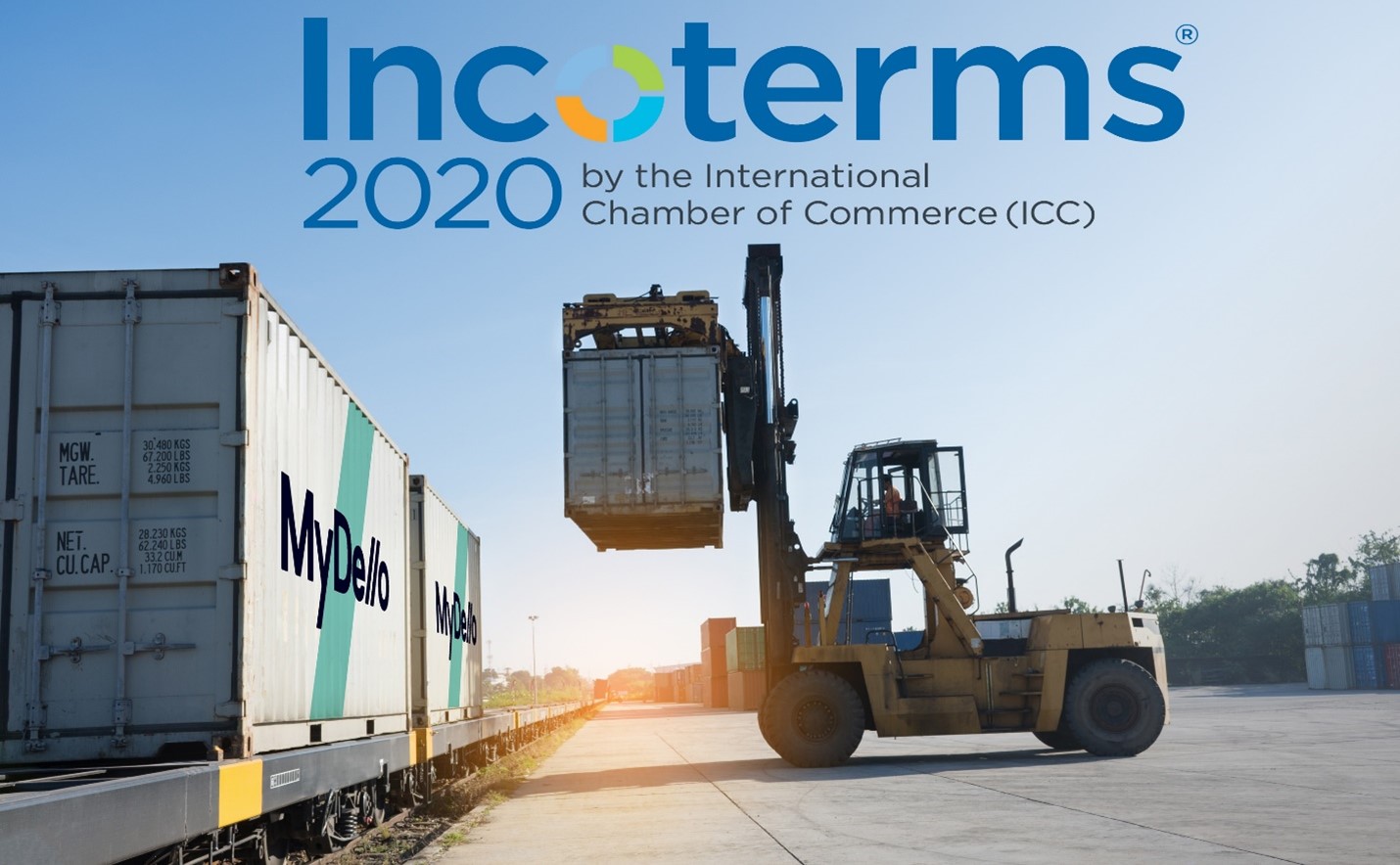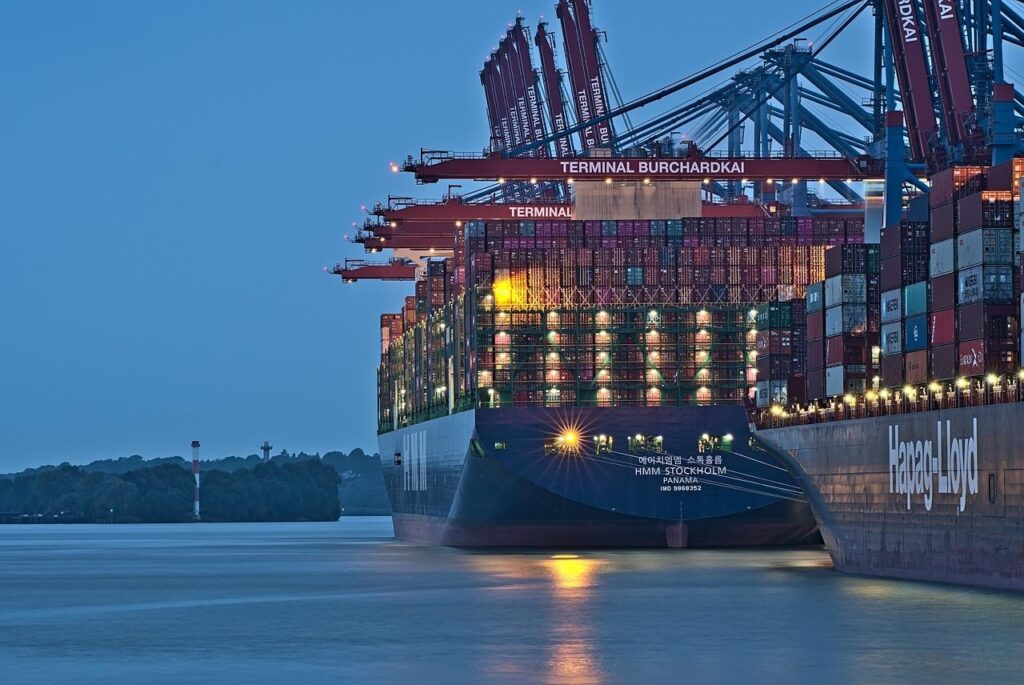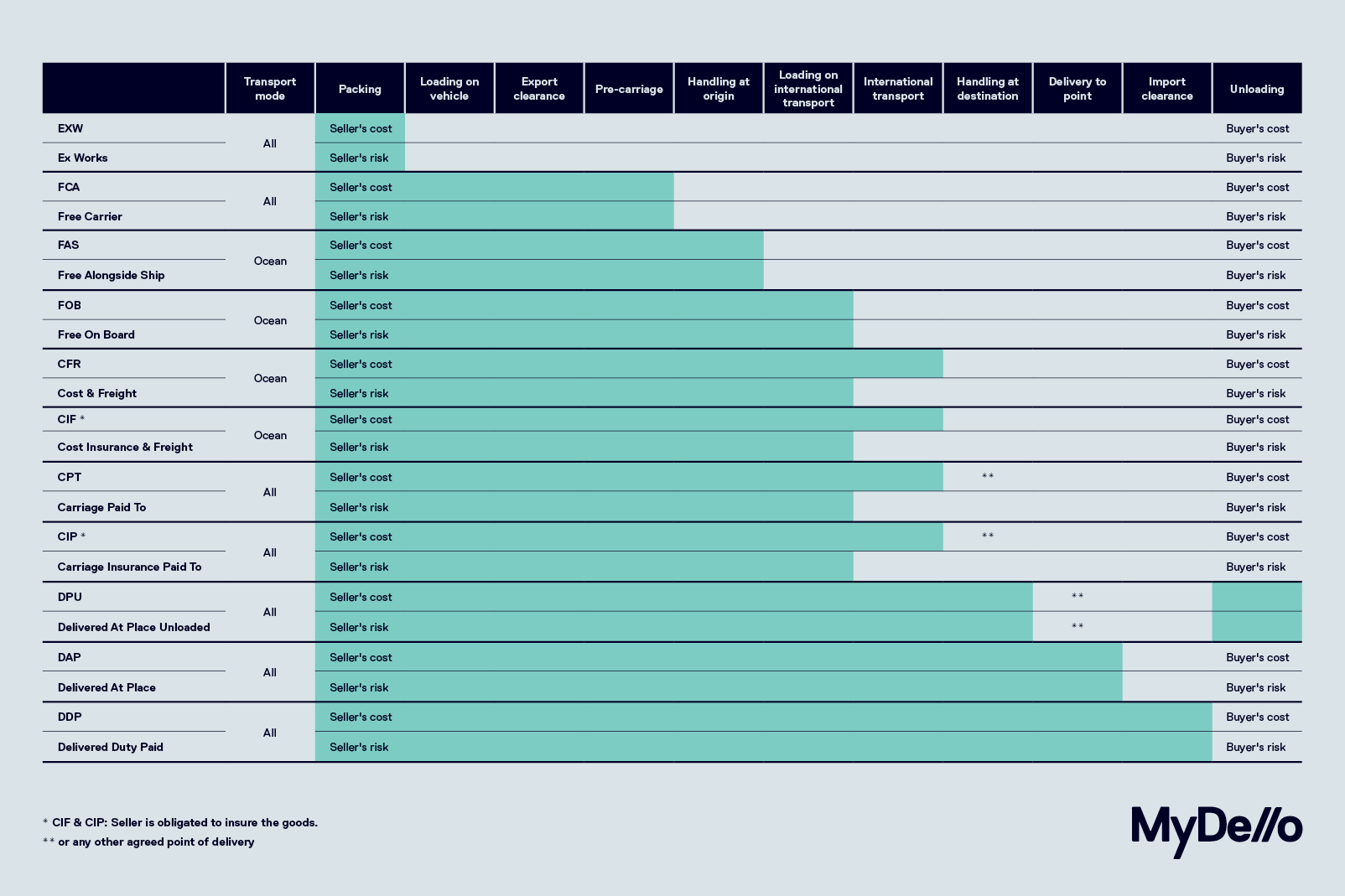
International trade and logistics are complex. Countries have different laws and regulations and it is really challenging to understand and follow them. Therefore, standardized global rules called terms of delivery, also known as incoterms 2020, have been set in place.
Contents
The Term Of Delivery is the standard contract used to define responsibility and liability between the seller and the buyer for the shipment of goods. Simply put, the term of delivery determines how far along into the process the supplier will ensure that the goods are moved and at what point the buyer takes over the shipment process.
There are two main aspects to consider:
Additionally, some Incoterms determine if the cargo needs to be insured.
Create Your No-Cost Account Today and experience the New Era of Logistics
The logistics industry can be confusing and we all need a little advice sometimes, give us a call and benefit from MyDello’s years of experience.
Incoterms are something everyone shipping goods internationally will encounter sooner or later. Short for International Commercial Terms, Incoterms are a set of pre-defined commercial terms which relate to international commercial law. These terms determine the rights and obligations of the parties involved in the purchase or sale of goods.
Why are Incoterms necessary? Because international trade and logistics are complex and countries have different laws and regulations, which are often challenging to understand and follow. International shipments thus run the risk of differing interpretations of rules in different countries.
To make international shipping more understandable for both buyers and sellers, standardized global rules called terms of delivery or incoterms 2020 have been set in place.

Incoterms can be recognized by a set of three-letter terms most commonly present in international contracts for the sale of goods. These terms are incorporated into sales contracts to provide a standard solution for delivery costs, risks and responsibilities. When shipping goods internationally, it is thus important to be aware of the meanings of different terms of delivery.
Incoterms are marked by three letters followed by a location: i.e. CIF London. This gives the buyer and seller information about the rules, risks and costs of the delivery as to the location. In order to understand the meaning of these Incoterms, we must first understand the different types of Incoterms.
In total, there are 11 rules that define who is responsible for what in international transactions: EXW, FCA, FOB, FAS, CPT, CIF, CFR, CIP, DPU, DAP, and DDP. Different Incoterms are used for different types of transportation. According to transportation, these terms are divided into two categories:
The newest set of Incoterms known as Incoterms 2020 is the ninth official version of Incoterms and was published on September 10, 2019. The International Chamber of Commerce published the first work on international trade terms in 1923, but the first Incoterm was officially published in 1936 and updated in the years to come.
While Incoterms are used to provide clarity about the transaction and international shipment rules, they can seem difficult to understand at first glance. To a layman, ‘CIF Incoterms’ might not mean much. Third-party logistics companies like MyDello deal with Incoterms every day, but it’s very important that both the buyer and seller understand exactly what they are signing when agreeing to an international sales contract.
Additionally, some Incoterms determine if the cargo needs to be insured. Not understanding Incoterms means that you might end up with a much larger shipment cost than originally planned. As such, Incoterms are and should always be taken into account when calculating freight rate estimations.
CFR, CIF and FAS Incoterms for example require the buyer to pay all costs at the port of destination and organize transportation from the port to the final destination. Unaware buyers might assume that the shipment will be delivered to the final destination and must deal with a bad surprise when the shipment arrives at the port of destination.
For a shipment from London to Shanghai, Incoterm CIP Shanghai will mean that the UK seller will be responsible for transporting the goods to the destination assigned by the buyer, in this case, Shanghai. The risk, however, is transferred to the buyer upon loading the goods from the seller’s premises. According to CIP Incoterm, the seller must also insure the goods while transit in the buyer’s favour.
If the goods happen to be damaged upon arrival and the seller’s insurance reimburses the buyer because that was in the CIP contract. Under CPT, the buyer would carry the loss themselves.
Thus it is important to understand the Incoterms related to your international shipment. For that, we must understand how Incoterms are read and what they mean. In general, Incoterms can be grouped into four categories according to the responsibility they place on the seller and buyer:
As seen above, buyers should always pay attention to Incoterms when quoting delivery costs for any shipment type, whether by land, air or sea. Some Incoterms will place more responsibility on the seller, whereas others might seem attractive to the seller. In any case, it pays to be aware of possible delays in international shipments and always thinks of every scenario to find the best solution for you.
Now that we understand why Incoterms are important and how they are categorized and used, it is time to get into each of them specifically. Here are all the Incoterms explained in depth. You can find a convenient and comprehensive table of all the Incoterms with their risks, costs and explanations here.
In addition to Incoterms, those dealing with international shipments, especially ocean freight, might come across additional terms and abbreviations. An overview of ocean freight terms alongside Incoterms can be found on this page.
These Incoterms will be familiar to any international logistics operators, merchants, manufacturers, exporters and importers. Each Incoterm is an abbreviation for the type of delivery contract. The following Incoterms 2020 apply to all transportation modes.
The seller makes the goods available at their premises, but the buyer incurs all the risks of bringing the goods to the final destination. This term places the maximum obligation on the buyer and minimum obligations on the seller. EXW is regularly used when making an initial quotation for the sale of goods without any transportation costs included.
Create Your No-Cost Account Today and experience the New Era of Logistics
If parties wish the seller to be responsible for loading the goods and bearing the risks and costs of loading, this must be made clear by adding concrete wording in the contract of sale.
The seller delivers the goods, cleared for export, at a named place, including the seller’s own premises. The goods can be delivered to a carrier named by the buyer, or to another party named by the buyer.
The seller is responsible for loading the goods onto the buyer’s carrier if the delivery occurs at the seller’s premises. If the delivery occurs at any other place, the seller is deemed to have delivered the goods once their transport has arrived at the named place and the buyer is responsible for both unloading the goods and loading them onto their own carrier.
The seller pays for the carriage of goods up to the named place in the destination country. But the goods are considered to be delivered when handed over to the first or main carrier. This means the risk transfers to the buyer upon handing goods over to that carrier at the place of shipment in the country of export. The seller has fulfilled their obligation when goods are handed over to the carrier, not when they reach the destination.
The seller is responsible for origin costs, including export clearance and freight costs for the shipment to the named place of destination. This could be either the final destination such as the buyer’s facilities or a port of destination. This has to be agreed to by the seller and buyer, however.
Similar to CPT, except that the seller is required to obtain insurance for the goods while in transit. Under Incoterms 2020, CIP requires the seller to insure the goods for 110% of the contract value. Again, the seller has fulfilled his obligation when the goods are handed over to the carrier, not when the goods reach their destination. Risk transfers from the seller to the first carrier upon handing over the goods.
The seller’s obligation is fulfilled when the goods are ready for unloading onto the incoming transport at the specified destination. Buyer bears the costs and risks of unloading the goods and arranges import customs clearance and import taxes if necessary.
The seller is required to deliver the goods and unload them at the named place of destination. The seller covers all the costs of transport including export fees and carriage, unloading from the main carrier at the destination port and destination port charges and assumes all risk until arrival at the destination port or terminal.
The seller’s obligation is fulfilled once the goods are unloaded at a specified destination and carry risk until arrival at the destination port or terminal. All charges after unloading (for example, import duty, taxes, customs and on-carriage) are to be borne by the buyer. However, it is important to note that any delay or demurrage charges at the terminal will generally be paid by the seller.
The seller is responsible for delivering the goods to the named place in the country of destination and paying all costs in bringing goods to the destination (incl. import duties and taxes). The buyer is responsible for the unloading. Risk is transferred to the buyer at the delivery of the goods at the named place of destination.
DDP requires the seller to be aware of any duties, taxes and regulations in the buyer’s country and should thus be used with caution.
Create Your No-Cost Account Today and experience the New Era of Logistics
These are the four Incoterms 2020 for international trade where transportation is conducted entirely by water.
It should be noted that these Incoterms are generally not suited for shipments in ocean freight containers. This is because the point at which risk and responsibility transfer is when the goods are loaded onboard of the ship – in containers it is impossible to verify the condition of the goods at this point.
The shipment is considered delivered when the goods are placed alongside the buyer’s vessel at the named port of shipment. This means that the buyer bears the costs and risks from that moment. FAS requires the seller to clear the goods for export by default. For alternative arrangements, the contract of sale should be modified.
The seller bears all costs and risks up to when the goods are loaded onboard the vessel. The seller’s obligations include the customs clearance of the export of the goods in the country of departure.
The seller pays for the carriage of the goods up to the named port of destination. Risk transfers to the buyer when the goods have been loaded onboard the ship in the country of export.
The seller is responsible for origin costs including export clearance and freight costs for carriage to the named port. The shipper is not responsible for delivery to the final destination from the port or for buying insurance.
The seller is responsible until the goods have been unloaded from the deck at the port of destination. The seller must handle customs clearance, main transport to the port of destination and insurance for the goods. The seller’s delivery obligation ends upon handing the goods over to the carrier.
Incoterms give vital information about the costs and responsibilities of international shipments. It is important to pay attention to Incoterms both when getting quotations from the merchant or manufacturer as well as transportation and logistics services.
Not knowing Incoterms can mean the difference between getting your shipment delivered on time versus having to pay extra delivery costs or organize last-mile deliveries yourself.
MyDello takes the stress out of global shipping. One platform, all freight modes, instant quotes. Find out more.


